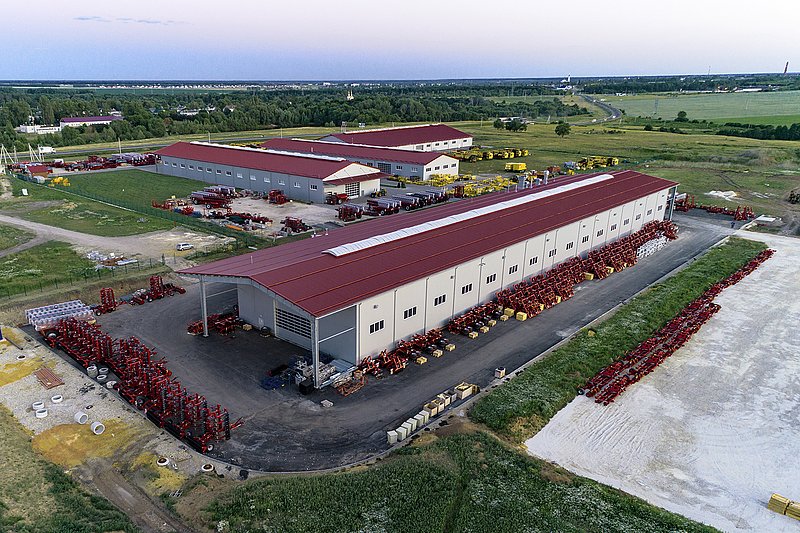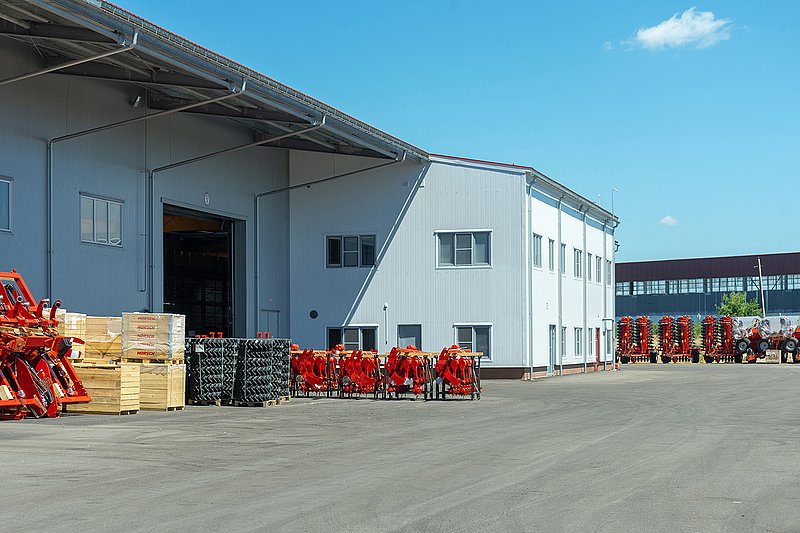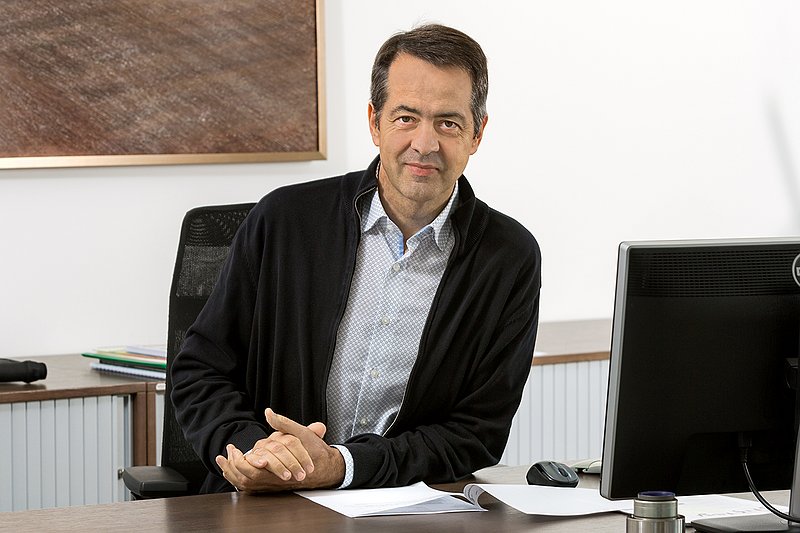
HORSCH worldwide – strategy for market penetration
The current market situation keeps a lot of companies busy. In the interview, Philipp Horsch explains how HORSCH supports its customers, how the company prepares for the years to come, why the company continues to grow to such an extent and how company culture helps to tackle things.
terraHORSCH: How does HORSCH experience this pandemic?
Philipp Horsch: When the pandemic started last year in March, there was a lot of uncertainty. We of course wondered what consequences it might have on our sites and the company in total. At that time, we were right in the middle of the spring season which was very difficult as we had a lot of orders and it was not foreseeable if there would be cancellations. We did not know if we could manage to support our service colleagues in the different foreign markets from our headquarters in Schwandorf appropriately. But it soon became clear that our subsidiaries on site were well prepared and managed everything more or less independently. In the course of the past year, the concerns at the beginning of the Covid-19 pandemic gave way to a continuously increasing growth trend.
terraHORSCH: What do you think led to the stable and strong development of the company in the past years?
Philipp Horsch: That’s hard to say, but I believe that for example the stable cereal prices as well as a certain pent-up investment which was obvious in some markets contributed considerably. I think that the uncertainty of the pandemic also played a major role. It probably was for this very reason that farmers invested to an increasing degree to safeguard assets. And this additionally pushed our growth. The growth dynamics even increased this year compared to the year before. We noticed that with regard to production capacities we reached our limits faster than we expected, especially in the sectors purchasing and production we are currently facing a bottleneck. This is why it is important to set the right course for the different regions based on these dynamics.
terraHORSCH: Are there individual regions that stand out from this growth dynamics?
Philipp Horsch: The current growth dynamics concerns all our markets, however some definitely stand out. Russia for example is growing strongly, Australia develops positively and in Brazil and the US, too, the markets are stable and develop very positively. There is no region that stagnates. This is almost a unique situation.
terraHORSCH: May that lead to an overheating in some countries and regions?
Philipp Horsch: Despite all the euphoria we are, of course, careful and we prepare for growth as well as for a possible slowdown and for having to react at short notice if required. It is difficult to predict what will happen. On the one hand the price situation for cereals is very stable worldwide that is very positive for the farmers. On the other hand almost all governments inject huge amounts of money into the systems which, of course, have to be spent. There are different effects that do not only bear on our sector but also on industrial production in total. The consequence is that for example the prices increase massively and therefore, inflation is fuelled. From today’s point of view, we cannot yet assess how this price increase spiral will affect our production costs. We try to handle this as considerately as possible and to dampen the situation to the best possible extent. Back to the question of a possible overheating: Despite the different special influences I mentioned we do not yet see the danger. We are carefully planning with a further growth in the years to come.
terraHORSCH: In the company’s history there have already been big leaps in growth. How did you deal with them at that time? Are there big differences today?
Philipp Horsch: Compared to previous years with the same percentage boosts to growth the current boost, of course, nominally is much bigger. One difference for example is that it becomes more and more difficult to provide the required capacity in the production department as soon as the real nominal boost achieves a certain size. In this case, the individual boost to growth for example of one year even corresponds to the turnover of one site – so you suddenly sort of need one more site and that’s a real challenge! A boost to growth normally arrives first in the production department, but we, of course, feel it in all other sectors of the company, too. So you have to keep at it and react in due time. So far, we have managed really well – all our employees always pull together and flexibly adapt to new conditions every time.
terraHORSCH: Regarding these dynamics – which limits does the company reach at the moment?
Philipp Horsch: This year we are facing special challenges, for on the one hand the boost to growth is considerably more pronounced compared to the previous years. On the other hand, we are confronted with considerable supply problems in the commodity market. Almost every day we hear bad news with regard to missing parts and the purchasing as well as the production department always have to react flexibly to this situation. I would not be surprised if we had a severe supply problem this year that cannot be solved quickly – so far this fortunately has not happened. But the supply situation will have an effect on us and our customers after all: This year we, too, have been struggling with occasional delays in delivery. We are doing our best and so far, we have almost always been able to solve the problem together with our sales partners and customers.
terraHORSCH: What we now see for the whole delivery chain – is this the consequence of the pandemic?
Philipp Horsch: Definitely yes! After a hard stop of the global industrial production in the middle of last year, business has been booming again extremely fast in almost all industrial sectors since the first quarter of this year, with regard to the demand partly beyond the pre-pandemic level! In some key sectors starting again is considerably more difficult and slower than braking – we notice this for quite a lot of things! If in such a situation material is getting scarce and at the same time more expensive, the result are hoarding effects which in turn lead to even more shortages etc… A vicious circle that takes quite some time to calm down. We are not yet past it!
terraHORSCH: How are you working, is there a long-term master plan?
Philipp Horsch: If you take a look at the DNA of our family business you will see that we always have been working agilely and flexibly. First and foremost, we are interested in global agronomic topics. As a result, we again and again re-define our strategic objectives at short intervals. It is part of our company culture to simply try out ideas and to realise them agilely. We have realigned the structure of our company accordingly and now distribute the tasks on more heads than before in a unit structure. This structural change and the distribution on more people are to help us to become even more agile and thus to manage the challenges of the future even better. To get back to your question about our way of planning: We perceive ourselves as an organisation that drives by sight rather than an organisation that follows a precise, long-term plan.
terraHORSCH: What do mean by driving by sight?
Philipp Horsch: We do not work according to a traditional five-year plan but look ahead to the different questions always focusing on what makes sense. This is what we mean by driving by sight. For example, we do not build a new production site because it is scheduled in some long-term plan, but because we notice that we will need this site for capacity reasons within the next few years. We only look ahead as long as the construction time for the site. In this case, we surely proceed differently from other companies. But we have never acted according to plans. It is by sight that we fix objectives and take decisions for different time horizons. Thus, we can always adapt very flexibly to changing conditions. For traditional product and marketing topics, too, we work on a short-term and agile basis. However, there are individual elements where you have to look further ahead. Some product topics take a lead time of several years with regard to the basic development. Others can be pushed and completed for serial production in a very short time. In autumn 2020 for example we virtually within a few minutes took the decision to expand the site in Ronneburg/Thuringia as during the weeks before it had become apparent that the capacity limits in our German sites would be reached faster than we originally thought. I observe that organisations that work with long-term plans to a disproportionate extent are busy revising these plans constantly and this is why we advocate as few long-term planning routines as possible. It would simply take up too much time which we want to use better. At the same time, for decades we have always been pushing the skill to take decisions fast. The journey is the reward, not the plan or the reward itself. It often is better if you don‘t think things through until the end, but simply get started. This is where our family culture takes over and what makes us tick.
terraHORSCH: So what is your “sight” worldwide with regard to the development of the sites and investments?
Philipp Horsch: We have been working in a decentralised way for years, i.e. we do not only rely on one site. We produce at six sites all over the world that are distributed over the important continents. We want to continue to produce on these continents – as close to the market and as flexibly as possible. In practice, we are going to expand the site in Ronneburg until the middle of 2022 as I have already mentioned. With this step we achieve a doubling of the capacity. At the same time, also until the end of 2022, we want to build a new paint site in Schwandorf. You have to interlink the assembly capacities with the paint capacities. In Landau we want to take the next steps in the crop care sector: We will expand the assembly capacities at short notice and the production capacities and the paint site, too, in the long run. Thus, all three sites in Germany are going to grow. In Brazil, there is a greenfield project: we are planning a new site at a new location in Curitiba. Brazil is a growing market for us. Our good market position is also due to the committed young team on site that perfectly puts our company DNA into practice. In Russia, too, we are going to expand our production capacities. The measures are already in full swing. In total, we are going to almost double our production capacities with these worldwide investment projects within the next two to three years.
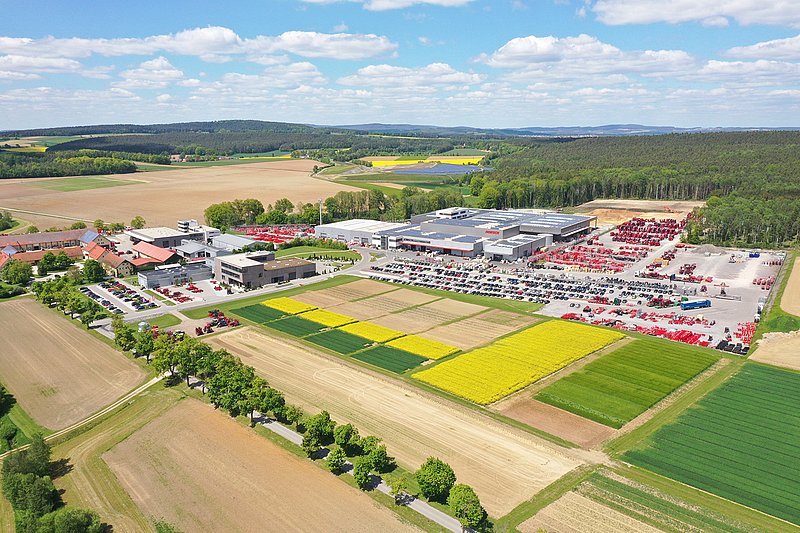
terraHORSCH: What are the factors that make you decide where to build a site?
Philipp Horsch: Quite a lot of topics are important for this decision. Among others the accessibility of the sites, if there is supplying industry in the surroundings or which industry culture prevails in the region, e. g. if there is mechanical engineering industry or rather dissimilar industries like clothing industry etc. What does not attract us at all are subsidies, incentives or tax rates. First and foremost, we orient ourselves towards long-term issues, especially towards human beings and the customers. Furthermore, we check which regions we want to deliver from the site, for the way to our customers should be as short as possible.
terraHORSCH: How do you convey the production know-how and the company culture to the new sites?
Philipp Horsch: We try to recruit especially the executive staff of a site at an early stage and train them as long as possible in Schwandorf - half a year or even a whole year. Thus, the executive staff gets to know our company culture and the way we work right from the start. Another advantage is that there already is a network between the parent and the subsidiary company. This facilitates communication enormously. At sites where we succeeded with this strategy our experiences and the consequences were excellent.
terraHORSCH: How about product developments?
Philipp Horsch: Our objective is the global interlinking of the product development and the product strategy. At the moment, we have four R & D sites: two in Germany, one in Brazil and one in the US. The interlinking of the sites is quite a challenge. On the one hand, each site wants to be independent, on the other hand we want to interlink them with each other and with the parent company. This starts with the IT infrastructure like CAD, ERP and PLM systems. And of course, all other sectors, like service, marketing or sales, also have to be interlinked. Our structural change towards a more agile ProductUnit structure is going to help in this respect. As we all know the product development predefines a lot of things, so it is our objective to develop according to the same standards all over the world. Not compulsively, but in a reasonable way, with the objective to assemble machines flexibly around the globe and to shift production quickly – as and when required. We, thus, want to meet the growing risk of currency fluctuations. The latter are a continuously increasing commercial risk. Especially last year they had a significant negative impact on the operating results.
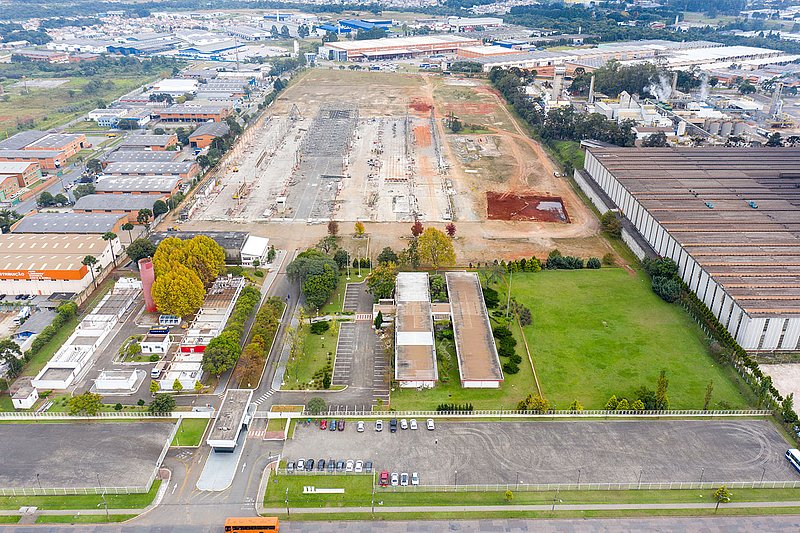
terraHORSCH: In your opinion, what is at the bottom of the positive development of the company?
Philipp Horsch: It’s the HORSCH style, the DNA of our company, in short: the way we work. For decades we have been orienting ourselves strategically according to the passion of our company. We want an intensive exchange with the arable farmers all over the world and we want to advance together. We take pleasure in all agricultural topics, in the changes in agriculture and in all the challenges involved. Topics that others might consider as a threat motivate us. Green Deal, topics like climate protection, nature protection or plant protection, any restrictions or the food and health discussions – we see them as a chance. We tackle these issues proactively together with our customers. We love this way of working. And it works extremely well in our company. Though everything is not always perfect, we work with passion and achieve good results.
